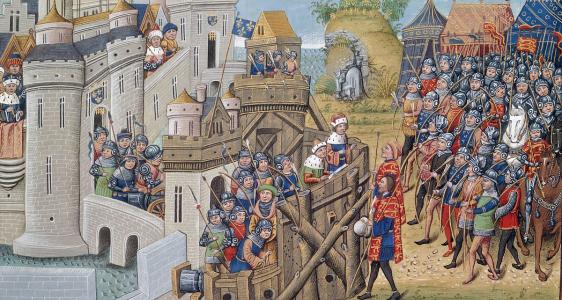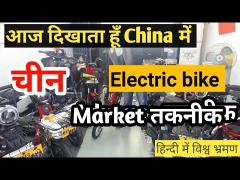quora: 15世纪的中国、印度和欧洲,哪个技术更先进?
Which was more technologically advanced in the 15th century, China, India or Europe?15世纪的中国、印度和欧洲,哪个
Which was more technologically advanced in the 15th century, China, India or Europe?
15世纪的中国、印度和欧洲,哪个技术更先进?
Quora评论翻译:
来源:三泰虎 http://www.santaihu.com/45862.html 译者:Jessica.Wu
外文:https://www.quora.com/Which-was-more-technologically-advanced-in-the-15th-century-China-India-or-Europe
Carter Langen, History geek
Yes. The Ming dynasty had a fleet larger than the combined fleets of all of Europe during the Napoleonic Wars, in the early 1400s. The Chinese could have colonized the world, but they did not need to.
在15世纪初的拿破仑战争期间,明朝舰队比整个欧洲的联合舰队都要大。中国人本可以殖民世界,但他们不需要。
Harold Suse, works at BP
China. Chinese civilisation stretches from at least 2000BC. China was ruled by a series of dynasties until 1911. From 1368 to 1644, the Ming Dynasty was in power.
中国。
中国文明至少可以追溯到公元前2000年。直到1911年,中国一直由一系列朝代统治。明朝统治从1368年到1644年,。
Gwydion Madawc Williams, Read a lot about this
China was probably more advanced. Its ships used for the "Treasure voyages" were well ahead of anything Europe had at the time.
Another example - drilling for gas using bamboo tubes was way ahead of Europe, with Europe borrowing a lot of the ideas to drill for oil.
It was not uniform. China showed little interest in glass and later imported window glass for windows.
China's weakness was the lack of anything like modern science.
中国可能更先进。“郑和下西洋”的舰队只远远超过当时欧洲的任何船只。
另一个例子是,用竹管钻探天然气,这比欧洲遥遥领先,欧洲借鉴了很多开采石油的创意。
但这也不是一概而论的,中国对玻璃和后来进口的窗玻璃兴趣不大。中国的弱势是缺乏现代科学方面的东西。
Drezner David, studied General Studies at Graduate of Alfred Universaity (1983)
In short-
At the time, both cultures were in flower, and the West had not yet discovered many practical uses for gunpowder, while the Chinese, if I recall, already had rockets and noisemakers, though they never got the barrel right for a while.
简而言之,当时这三种文命都在蓬勃发展,西方还没有发现火药的许多实际用途,而中国人,如果我没记错的话,已经有了火箭,尽管在一段时间内他们没有把炮管调对。
The Chinese were mapping the world, and one theoretician says that Portugal stole the Chinese maps that led them to the East.
那时,中国人在绘制世界地图,一位理论家曾说,葡萄牙人偷走了中国人绘制的地图,这才把他们带到了东方。
Both had flourishing science, armor, sophisticated war techniques, and things like pumps and clocks which Europe didn't get for a while. They had a culture of scholarship, and I don't believe that the West ever could hold a candle to the Confucian scholarship system for chosing public officials. In Europe, if you could read, it was a miracle.
他们拥有蓬勃发展的科学、盔甲、精密的战争技术,还有欧洲一度没有的泵和钟表。他们有一种学术文化,我认为在选择政府官员上,西方永远无法与儒家的学术制度相提并论。
The renaissance everyone talks about did come up with a lot of new inventions, technologies, and culture, true, but a lot of it was the re-discovery of the old Greek sciences. Contact with the Arabs had re-taught Greek to the classicissts, and a lot of the sciences were rekindled by the Greek spirit of written experiments that weren't informed by theories of Aristotle, or rather, restricted.
大家谈论的文艺复兴确实产生了很多新的发明、技术、和文化,没错,但是很多是对古老希腊科学的重新发现。与阿拉伯人的接触使古典主义者重新学会了希腊语,许多科学又被希腊人的书面实验精神所重新点燃,而这些书面实验的理论不是亚里士多德所提供的,更确切地说,是受其限制的。
The church was losing it's vise-grip on the mind of people, and just as importantly, and often forgotten, the vicious rounds of the Plagues that wiped out up to 30% of Europe in some periods were winding down, allowing people to stop praying endlessly so it would hit their family, this time. City states were rising, etc...
教会逐渐失去了对人们思想的控制,同样重要但也经常被遗忘的是,在某些时期,横扫欧洲30%人口的瘟疫的恶性循环正在逐渐结束,让人们停止了无休止的祈祷。同时,城邦也正在崛起,等等……
So, I'd call it a draw in the 15th century, which is fine, since they never met.
In the 16th century, the technology award goes to the Turks, and most efficient use of gun-powder, and the advantage of not losing many of the old roman technologies that theWest had lost long ago.
Yep- waterproof cement. Invented by the Romans, used by the Turks, forgotten by the West until the 18th or 19th century!
所以,我认为15世纪是一个平局,因为三种文明从未有交集。
在16世纪,“技术奖”要颁给土耳其人,他们最有效地使用了火药,而且其优势还在于,没有丧失很久以前西方早已失去的许多古罗马技术。还有防水水泥,由罗马人发明,土耳其人使用,但一直被西方忘记直到18或19世纪!
Daniel Baker, Spent nine months in China and taught English there
I’m going to say that, at least by the end of the 15th century, Europe had a slight edge. Not so much because of the specific technologies it had that China and India didn’t - the longbow, plate armor, stained glass. These were arguably surpassed by India’s comparatively more advanced textiles, suspension bridges, and its unique use of elephants as beasts of burden, and China’s porcelain, seismography, and canal engineering. And the keys to the future did not lie in plate armor, the longbow, or stained glass anyway. But the European caravel and carrack, with their lateen sails, were the way forward to the modern ships that would make Europeans mappers and masters of the world’s oceans; Zheng He’s leviathans were simply too huge and expensive to be practical for exploring the world, even if China had not crippled itself with the Haijin edicts against long-distance voyages.
我想说的是,至少在15世纪末,欧洲在技术方面还有一点优势的。这并不是因为它拥有中国和印度没有的特殊技术——长弓、板甲、彩色玻璃。可以说,这些都被印度相对先进的纺织品、悬索桥、以及独特的使用大象作为驮兽,以及中国的瓷器、地震学和运河工程所超越了。而通往未来的钥匙并不在于板甲、长弓或彩色玻璃。但是欧洲的轻快帆船和大帆船,以及它们的斜挂大三角帆,才是通往现代船舶的之道,这些船舶将使欧洲人成为世界海洋的制图者和主人。郑和的巨轮实在是太过庞大和昂贵了,根本不适合探索世界,即使中国没有因为海禁而陷入瘫痪,它们也无法进行长途航行。
Still the most remarkable advantage Europe had by the end of the 15th century was its receptiveness to new technology. Europe had achieved this state of parity to India and China largely by absorbing, or at best replicating, Indian and Chinese technology: gunpowder, rockets, the movable type printing press, the crossbow, the compass, the spinning wheel, Hindu-Arabic numerals, silk production, horse collars, the moldboard plow, stirrups. Without this willingness and ability to adopt newfangled outlandish tricks, Europe would have remained a backwater, as it had been for most of history. There was no similar move by China or India to adopt Gothic plate armor, the longbow, stained glass, or the caravel or carrack. As late as 1792, the Qianlong Emperor contemptuously dismissed British offerings of spring clocks, telescopes, planetaria, and warship designs: “Our Celestial Empire possesses all things in prolific abundance and lacks no product within its borders. There is therefore no need to import the manufactures of outside barbarians.” That was the attitude that reduced China from being clearly the most powerful empire in the world in the 1400s to humiliation at the hands of an island kingdom with a tenth of its population in the 1800s.
到15世纪末,欧洲最显著的优势仍是对新技术的接受能力。欧洲之所以能与印度和中国平起平坐,很大程度上是通过吸收(或者至多是复制)印度和中国的技术:火药、火箭、活字印刷术、弩、指南针、纺车、印度教阿拉伯数字、丝绸生产、马项圈、铧式犁、马镫。如果没有这种愿意和能力吸收新技术,欧洲就会像历史上大部分时间一样,仍然是一潭死水。中国和印度没有采取类似的行动,吸收欧洲的技术比如:哥特式板甲,长弓,彩色玻璃,轻快帆船或大帆船。早在1792年,乾隆皇帝就轻蔑地摒弃了英国提供的弹簧钟、望远镜、星象仪和军舰设计:“天朝物产丰盈,无所不有,原不籍外夷货物以通无有。”这种态度让中国从15世纪世界上最强大的帝国,沦落到在19世纪被占其人口十分之一的岛国所羞辱。
Kaiser Kuo, Lived in Beijing for 20 years, from 1996 to 2016
You picked just about the most difficult century to make an easy call on. China in the first century of the Ming dynasty was quite technologically advanced: anyone with a passing familiarity with Chinese history and culture at the time will think of the ocean-going vessels of Admiral Zheng He's fleet, of the massive imperial kilns at Jingdezhen and the unrivaled Chinese abilities in porcelain, the fact that moveable type printing was already commonplace. There was already current a kind of proto-empiricist or rationalist strain of thought (this is debatable) ascendant in early Ming—the legacy of the the eminent Song Dynasty Neo-Confucian thinker, Zhu Xi.
中国在明朝统治的第一个世纪,技术相当先进。任何稍微熟悉中国这段历史和文化的人,都会想起郑和舰队的远洋船只,景德镇巨大的御窑和无与伦比的瓷器制作能力,活字印刷术在那时已经是司空见惯了。明朝早期,理学思想(这是有争议的)影响力渐大——这是宋代著名理学家朱熹的遗风。
But Europe during that time—especially Italy—the Renaissance was in full flower and the brilliance of Islamic civilization and of the Aristotelian and other classical philosophical traditions it had preserved were already transforming thinking and laying the groundwork for the Age of Reason. Clumsy Roman numerals had by this time already mostly given way to the Indo-Arabic numerals we now use, and with that, there were tremendous advances in mathematics. The Age of Exploration was already underway. And Europe was on the cusp of the Reformation: Erasmus already writing broadly, Abelard in France, and William of Occam in England, had already advanced logic considerably. Wycliffe and Hus had already challenged clerical authority and paved the way for a revolution in thought.
但在那段时间里,欧洲,尤其是意大利——文艺复兴盛极一时,ysl文明、亚里士多德和其他古典哲学传统的光辉已经改变了人们的思维,为理性时代奠定了基础。那时,笨拙的罗马数字已经基本被我们现在使用的阿拉伯数字(印度人发明的)所取代,在这之后,数学有了巨大的进步,探险时代已经开始了。欧洲正处于宗教改革的风口浪尖:伊拉斯谟的著作已经很广泛,法国的阿伯拉德和英国的奥卡姆的威廉已经大大提高了逻辑学的水平。威克利夫和胡斯已经挑战了牧师的权威,并为思想革命铺平了道路。
I think the 15th century was really the inflection point, and by the early 16th, it was pretty clear that Europe had a kind of internal dynamism that was going to produce more technological breakthrough—nothing like endemic warfare to do that—while China was in what some scholars have described as a "high-energy equilibrium trap," where the incentive for technological innovation wasn't really there.
我认为15世纪是真正的转折点。到16世纪初早期,欧洲很显然有一种内在动力,会产生更多的技术突破。而当时的中国则处在一些学者所称的“高水平均衡陷阱”里,在那时技术创新的动力并不存在。(注:“高水平均衡陷阱”认为中国之所以在工业革命前一千多年里领先世界,而后又被欧洲所赶超,是因为中国受到人口众多资源匮乏的限制)
版权声明
我们致力于传递世界各地老百姓最真实、最直接、最详尽的对中国的看法
【版权与免责声明】如发现内容存在版权问题,烦请提供相关信息发邮件,
我们将及时沟通与处理。本站内容除非来源注明五毛网,否则均为网友转载,涉及言论、版权与本站无关。
本文仅代表作者观点,不代表本站立场。
本文来自网络,如有侵权及时联系本网站。
阅读:
-
1
चाइना में रेडी और ठेले Local shops in china || L...
- 2
- 3
- 4
- 5
- 6
- 7
- 8
- 9
- 10
-
1
चाइना में रेडी और ठेले Local shops in china || L...
- 2
- 3
- 4
- 5
- 6
- 7
- 8
- 9
- 10











